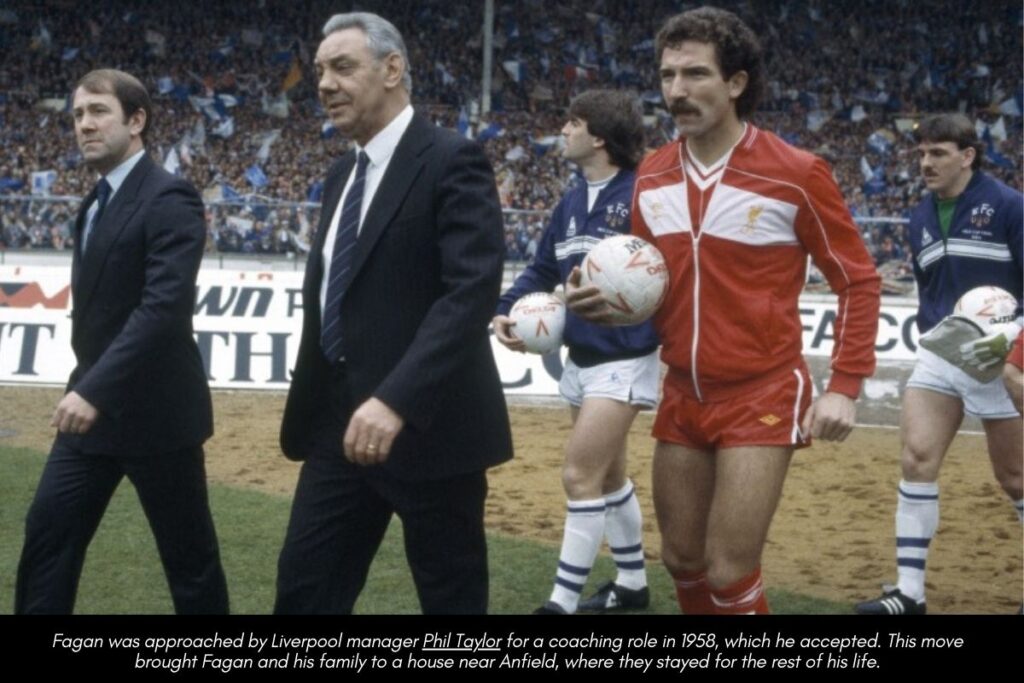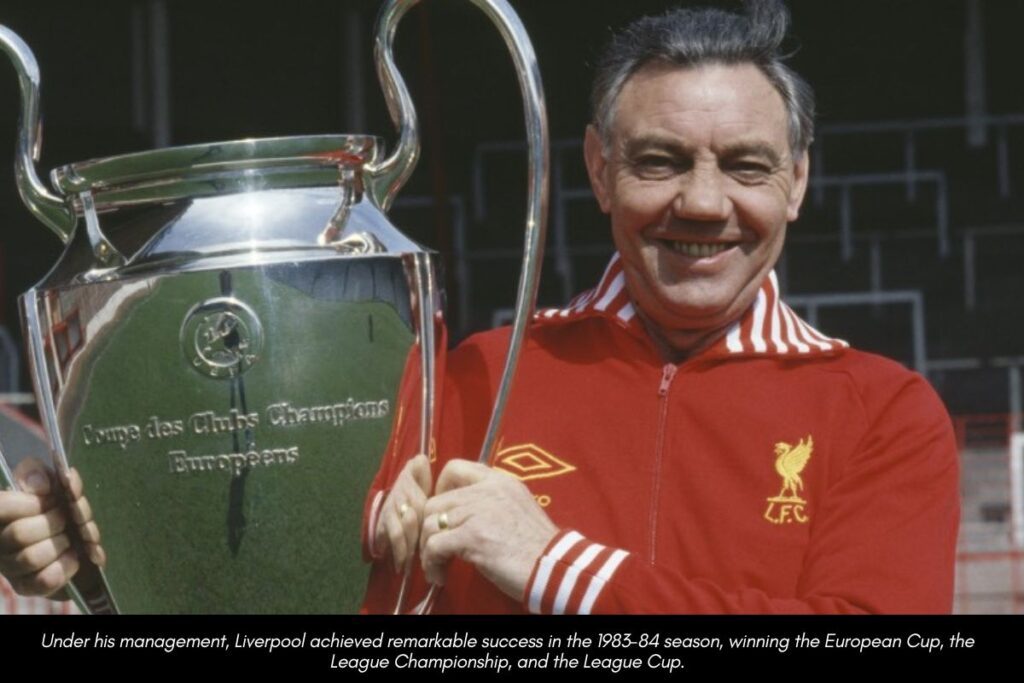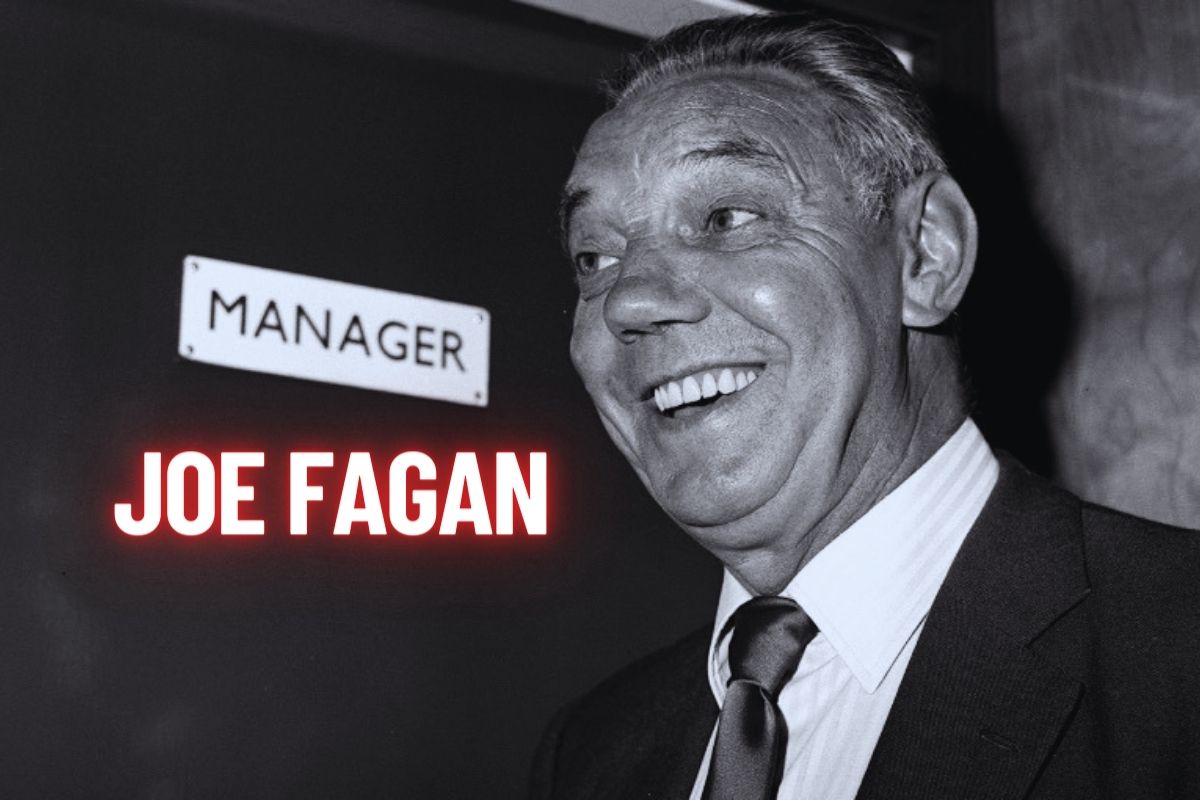Joe Fagan, an integral figure in Liverpool FC’s storied history, arrived at the club in 1958, marking the beginning of a remarkable journey. Initially a coach, he later became assistant to Bill Shankly and then succeeded Bob Paisley as manager. Fagan’s tenure as manager was marked by unparalleled success, notably clinching an unprecedented treble in his debut season – the European Cup, League Championship, and League Cup. His football philosophy, grounded in simplicity and dedication, fostered the development of iconic players like Roger Hunt and Ian Callaghan.
Beyond his managerial prowess, Joe Fagan’s personal integrity and steadfast commitment to his family and club endeared him to fans and players alike. His career, however, was not without poignant moments, including the tragic Heysel Stadium disaster. As we delve deeper, explore Fagan’s impact on English football and his lasting legacy at Liverpool FC.
Early Life and Career
Joe Fagan was born in Walton Hospital, Liverpool, to Patrick and Mary Fagan, both of Irish descent. His early years were spent in the Litherland and Scotland Road areas of the city. Despite his father’s frequent absence, Fagan enjoyed a happy childhood largely due to his mother’s care. Growing up near Anfield and Goodison Park, football played a central role in his life, and he honed his skills from a young age.
At fourteen, Joe Fagan captained his school, St Elizabeth Central, to victory in the Daily Dispatch Trophy, a notable competition among Lancashire schools. After leaving school in 1937, he joined Earlestown Bohemians, a strong amateur club in the Liverpool County Combination league where he caught the eye of Liverpool FC. Although offered a contract by Liverpool, Fagan declined at seventeen, concerned about limited first-team opportunities. Instead, he signed for Manchester City in October 1938.
Fagan played primarily as a right-half throughout his career, with occasional stints at center-half. His progress at Manchester City was promising until the outbreak of World War II, which halted the football season and interrupted his rising career.
Ineligible for the Armed Forces, WW2
At eighteen, Joe Fagan was initially ineligible for the armed forces, so Manchester City allowed him to play for Hyde United in the Cheshire County League, which wasn’t under the same wartime restrictions as the Football League. The league continued for only one season before being suspended in 1940. Fagan and his City teammate Billy Walsh debuted for Hyde on 13 October 1939, contributing to a 2–1 victory over Stalybridge Celtic. Fagan played 26 games for Hyde, receiving positive reviews in the local press. Hyde had a successful season, winning the Cheshire League’s East Section but losing the championship playoff to Runcorn.
For the 1940–41 season, Joe Fagan returned to City as regional leagues resumed. He debuted in a goalless draw against Everton and played five matches before becoming eligible for military service. Opting to volunteer, he joined the Royal Navy, despite being prone to seasickness. Stationed in Egypt, he worked as a telegraphist with a minesweeping flotilla until 1946. Fagan avoided the fate of many colleagues assigned to the ill-fated HMS Hood, a fact he always considered fortunate.
During his naval career, he engaged in boxing until a broken nose ended his interest. He played football for service teams in Alexandria, winning the Chrystall Cup in January 1946. While on leave in England, Joe Fagan represented City in six regional league matches and also played for Portsmouth. He returned to Britain and was demobilized shortly after.
Regular Spot in Manchester City
After World War II, Joe Fagan aimed to secure a regular spot in Manchester City’s lineup. The team, then in the Second Division, was a strong promotion contender under manager Wilf Wild, featuring notable players like Sam Barkas, Frank Swift, and Alex Herd. The season began well, but a managerial change in November saw pre-war captain Sam Cowan take over. Cowan’s innovative approach led to Fagan’s official debut on 1 January 1947, in a 4-0 victory against Fulham at Maine Road. At 25, Fagan played as right-half and delivered a commendable performance.

Joe Fagan was instrumental in City’s 1946-47 Second Division Championship-winning team, making 121 consecutive league appearances from his debut until November 1949. He was recognized for his positional judgment, heading ability, and reliability. Upon City’s promotion to the First Division in 1947-48, Fagan remained a fixture in the team, maintaining an ever-present status for two seasons. His strong team ethic, loyalty, and cheerful demeanor made him a beloved figure at Maine Road. Nicknamed “Patsy” by his friend Frank Swift, Fagan first encountered future colleague Bob Paisley during a 2-0 win over Liverpool in November 1947, with City finishing the season one place above Liverpool in tenth.
The 1948-49 season, under new manager Jock Thomson, saw City finish seventh, with Fagan again playing every match. However, the 1949-50 season was disappointing, leading to Thomson’s dismissal and City’s relegation. In 1951, a broken leg forced Fagan, then 30, to consider his future, having made 138 appearances and scored two goals for City. Fagan transitioned to coaching, becoming player-manager at Nelson in the Lancashire Combination. He led Nelson to the 1951-52 championship while simultaneously working in a factory. Despite Nelson’s unsuccessful bid for Football League re-election, Fagan briefly returned to the Football League, making three appearances for Bradford Park Avenue in 1953, followed by a stint at Altrincham.
Switching to Liverpool FC
Joe Fagan’s transition from Manchester City to Liverpool FC marked a significant shift in his coaching career. Initially recommended by Everton’s Harry Catterick, Fagan was approached by Liverpool manager Phil Taylor for a coaching role in 1958, which he accepted. This move brought Fagan and his family to a house near Anfield, where they stayed for the rest of his life. Upon his arrival at Liverpool, Fagan found himself part of a formidable coaching team under the leadership of the legendary Bill Shankly, who joined Liverpool as manager in December 1959. Shankly, delighted to have Fagan on board, quickly integrated him into his coaching strategy, entrusting him with the reserve team.

Following the successful tenures of Shankly and Bob Paisley, Fagan was appointed as Liverpool’s manager on July 1, 1983. Despite initial reluctance, Fagan’s deep knowledge of the club and its players made him the ideal candidate. Under his management, Liverpool achieved remarkable success in the 1983-84 season, winning the European Cup, the League Championship, and the League Cup—a historic treble that solidified Fagan’s legacy.
The following season proved challenging, and despite Liverpool finishing second in the league and reaching the European Cup final, Fagan decided to retire. His decision was announced on May 29, 1985, shortly after the tragic Heysel Stadium disaster, which profoundly affected him. Kenny Dalglish succeeded Fagan, continuing as player-manager. Joe Fagan was known for his quiet, unassuming demeanor and exceptional coaching ability. Respected throughout football, he was often praised for his tactical acumen and player management. Fagan’s coaching style emphasized teamwork, discipline, and a deep understanding of the game, qualities that endeared him to players and colleagues alike.
Fagan remained closely connected to Liverpool FC even after his retirement, frequently visiting Anfield and Melwood to offer advice and support to his successors. Despite his achievements, he shunned the limelight, preferring a life of modesty and dedication to football. His profound impact on Liverpool’s success during his tenure remains a testament to his enduring legacy in the club’s history.
Conclusion
Joe Fagan’s legacy at Liverpool FC is marked by his profound contributions to the club’s golden era. Under his leadership, the club achieved historic success, most notably the treble in the 1983-84 season, making him the first English manager to secure three major trophies in a single season. Renowned for his quiet yet impactful coaching style, Fagan’s influence extended beyond the pitch, fostering a culture of loyalty, teamwork, and excellence. Even in retirement, his presence at Anfield and Melwood was a source of inspiration and guidance. Joe Fagan’s humility, dedication, and tactical brilliance ensure his lasting place in the annals of Liverpool FC’s storied history.
Read all other posts on Joe Fagan
Stay tuned for more updates on Liverpool FC Times and Stories. Your thoughts are always welcome in the comments section. Thank you for your continued support!
YNWA (You’ll Never Walk Alone)!
The Liverpool FC Times Team
LiverpoolFCTimes.com
